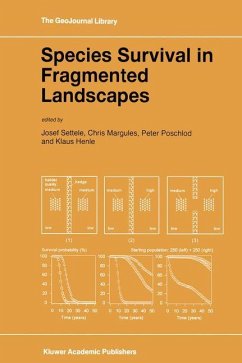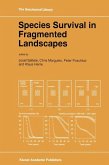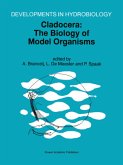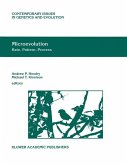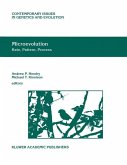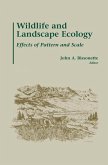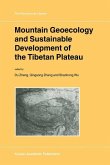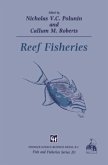Settele
Species Survival in Fragmented Landscapes
Herausgegeben:Settele, J.; Margules, Chris; Poschlod, Peter; Henle, Klaus
Settele
Species Survival in Fragmented Landscapes
Herausgegeben:Settele, J.; Margules, Chris; Poschlod, Peter; Henle, Klaus
- Gebundenes Buch
- Merkliste
- Auf die Merkliste
- Bewerten Bewerten
- Teilen
- Produkt teilen
- Produkterinnerung
- Produkterinnerung
The effects of isolation, area size, and habitat quality on the survival of animal and plant populations in the cultural landscape are central aspects of a research project started in Germany in 1993 (,Forschungsverbund, Isolation, FHichengroBe und BiotopquaIiHit', abbreviated to 'FIFB'). After a long period of preparation, scientists from seven univer sities and one research institution started to work within the frame of this project. Fund ing for four years was provided by the former German Federal Ministry of Research and Technology (BMFT), now the Ministry of Education and Research…mehr
Andere Kunden interessierten sich auch für
![Species Survival in Fragmented Landscapes Species Survival in Fragmented Landscapes]() Species Survival in Fragmented Landscapes154,99 €
Species Survival in Fragmented Landscapes154,99 €![Cladocera: the Biology of Model Organisms Cladocera: the Biology of Model Organisms]() Cladocera: the Biology of Model Organisms37,99 €
Cladocera: the Biology of Model Organisms37,99 €![Microevolution Rate, Pattern, Process Microevolution Rate, Pattern, Process]() Microevolution Rate, Pattern, Process156,99 €
Microevolution Rate, Pattern, Process156,99 €![Microevolution Rate, Pattern, Process Microevolution Rate, Pattern, Process]() HendryMicroevolution Rate, Pattern, Process156,99 €
HendryMicroevolution Rate, Pattern, Process156,99 €![Wildlife and Landscape Ecology Wildlife and Landscape Ecology]() Wildlife and Landscape Ecology110,99 €
Wildlife and Landscape Ecology110,99 €![Mountain Geoecology and Sustainable Development of the Tibetan Plateau Mountain Geoecology and Sustainable Development of the Tibetan Plateau]() Mountain Geoecology and Sustainable Development of the Tibetan Plateau74,99 €
Mountain Geoecology and Sustainable Development of the Tibetan Plateau74,99 €![Reef Fisheries Reef Fisheries]() Nicholas V. C. PoluninReef Fisheries77,99 €
Nicholas V. C. PoluninReef Fisheries77,99 €-
-
-
The effects of isolation, area size, and habitat quality on the survival of animal and plant populations in the cultural landscape are central aspects of a research project started in Germany in 1993 (,Forschungsverbund, Isolation, FHichengroBe und BiotopquaIiHit', abbreviated to 'FIFB'). After a long period of preparation, scientists from seven univer sities and one research institution started to work within the frame of this project. Fund ing for four years was provided by the former German Federal Ministry of Research and Technology (BMFT), now the Ministry of Education and Research (BMBF). A strong focus of the project has been the improvement of the methodology for environmental impact assessments and the implementation of results into environmental planning. As there is a certain risk that national projects develop some kind of 'mental in breeding', it was decided to discuss concepts, methods, and first results with scientists of international reputation at a rather early stage of the project. For this purpose, an inter national workshop was held in the small village of Lubast, north of Leipzig (state of Saxony) in March 1995. 130 scientists from 10 nations met to discuss and debate issues surrounding habitat fragmentation for three days. Papers presented there formed the basis for this book. As discussions included general reviews as well as particular case studies, we decided to structure this book in a similar way. Consequently, a combination of broad and more general, review-like papers as well as original papers are presented.
Produktdetails
- Produktdetails
- GeoJournal Library 35
- Verlag: Springer / Springer Netherlands
- Artikelnr. des Verlages: 978-0-7923-4239-7
- 1996.
- Seitenzahl: 404
- Erscheinungstermin: 30. September 1996
- Englisch
- Abmessung: 241mm x 160mm x 27mm
- Gewicht: 765g
- ISBN-13: 9780792342397
- ISBN-10: 0792342399
- Artikelnr.: 27628549
- GeoJournal Library 35
- Verlag: Springer / Springer Netherlands
- Artikelnr. des Verlages: 978-0-7923-4239-7
- 1996.
- Seitenzahl: 404
- Erscheinungstermin: 30. September 1996
- Englisch
- Abmessung: 241mm x 160mm x 27mm
- Gewicht: 765g
- ISBN-13: 9780792342397
- ISBN-10: 0792342399
- Artikelnr.: 27628549
Prof. Dr. Peter Poschlod studierte Biologie in Ulm. Er promovierte an der TUM-Weihenstephan und habilitierte an der Universität Hohenheim. Von 1994 bis 2001 war er Professor für Wissenschaftlichen Naturschutz der Philipps-Universität Marburg, seit 2001 ist er Inhaber des Lehrstuhls für Botanik der Universität Regensburg.
I Case Studies on Species Survival in Fragmented Landscapes.- The case for a science-based strategy of conserving threatened butterfly populations in the UK and north Europe.- Decline and rehabilitation of the Apollo butterfly Parnassius apollo (LINNAEUS, 1758) in the Pieniny National Park (Polish Carpathians).- Effects of habitat fragmentation on the butterfly Maculinea alcon in the Netherlands.- Forest resource management and the conservation of arboreal marsupials in Central Victoria, South-Eastern Australia.- The conservation biology of a specialist and generalist gecko in the fragmented landscape of the Western Australian wheatbelt.- Bird population dynamics in relation to habitat quality.- Population size, genetic variation, and related parameters in small, isolated plant populations: a case study.- Habitat networks in the fragmented landscape of the Western Australian wheatbelt: Preliminary results, involvement with landcare groups, and experience in implementation.- II A Reviewof Species Survival in Fragmented Habitats: Theory and Approaches.- Species survival and metapopulations: Conservation implications from ecological theory.- Genetical aspects of fragmented plant populations.- Applications of population viability analysis in conservation biology in Australia.- Area requirements and isolation: Conservation concepts and application in Central Europe.- Dispersal of plants in fragmented landscapes - Changes of dispersal processes in the actual and historical man-made landscape.- Experimental fragmentation.- Landscape fragmentation and landscape planning, with a focus on Germany.- III The FIFB Project.- FIFB: Conceptual frame.- Studying species survival in fragmented landscapes: the approach of the FIFB.- FIFB: the hilly landscape of Halle - main study area.- The Hilly landscape of Halle - main study area of the FIFB: Natural history and the selection of target species for conservation biological research.- Vegetation Cover of porphyry Outcrops.- Vegetationstructure of the porphyry Landscape of Halle.- Relations of invertebrate species to habitat Quality in the fragmented Porphyry Landscape near Halle (Sachsen-Anhalt, Germany).- Invertebrates and area size in the porphyry Landscape of Halle.- Invertebrates and Isolation in the porphyry Landscape of Halle.- FIFB: Survival of plants in fragmented landscapes.- Why are some plant species of fragmented continental dry grasslands frequent and some rare? - The role of germination and establishment.- Survival of small isolated populations of Muscari tenuifolium TAUSCH in dry continental Grasslands - The role of reproduction.- Restoration of fallow or afforested calcareous grasslands by clear-cutting.- A coenotical approach of plant population viability analysis on successional and afforested calcareous grassland sites - Towards an ecological flora data base.- FIFB: Survival of vertebrates in fragmented landscapes.- Survival of birds in fragmented landscapes.- Survival of lizards in habitat islands in Central Europe - Introduction and summary conclusions.- Survival of the sand lizard Lacerta agilis LINNAEUS, 1758 (Sauria, Lacertidae) in relation to habitat quality and heterogeneity.- Consolidation of vineyards, mitigations, and survival of the common wall lizard (Podarcis muralis) in isolated habitat fragments.- FIFB: Survival of butterflies in fragmented landscapes.- Research on population viability of Melitaea didyma (Lepidoptera, Nymphalidae).- A population ecological study of Chazara briseis (Lepidoptera, Satyrinae).- Aspects of the population vulnerability of the large blue butterfly, Glaucopsyche (Maculinea) arion, in South-West Germany.- Towards demographic population vulnerability categories of butterflies: Requirements of and species selection for future population ecological research.- FIFB: Survival of grasshoppers and bush crickets in fragmented landscapes.- The ecological background of population vulnerability in central European grasshoppers and bush crickets: Abrief review.- A population vulnerability analysis of the stripe-winged grasshopper, Stenobothrus lineatus (Caelifera: Acrididae).- A population vulnerability analysis of the red-winged grasshopper, Oedipoda germanica (Caelifera: Acrididae).- Elements of population vulnerability of the blue-winged grasshopper, Oedipoda caerulescens (Caelifera: Acrididae).- Population vulnerability of the grey bush cricket Platycleis albopunctata (GOEZE, 1778) (Ensifera: Tettigoniidae).- FIFB: Survival of snails in fragmented landscapes.- Survival of snails in fragmented landscapes.- FIFB: Genetics, habitat models, and implementation.- Genetics of insect populations in fragmented landscapes - A comparison of species and habitats.- Mapping and assessing habitat models on the landscape level.- Implementation of FIFB results in environmental planning.- IV Summary Conclusions.- Species survival in relation to habitat quality, size, and isolation: Summary conclusions and future directions.
I Case Studies on Species Survival in Fragmented Landscapes.- The case for a science-based strategy of conserving threatened butterfly populations in the UK and north Europe.- Decline and rehabilitation of the Apollo butterfly Parnassius apollo (LINNAEUS, 1758) in the Pieniny National Park (Polish Carpathians).- Effects of habitat fragmentation on the butterfly Maculinea alcon in the Netherlands.- Forest resource management and the conservation of arboreal marsupials in Central Victoria, South-Eastern Australia.- The conservation biology of a specialist and generalist gecko in the fragmented landscape of the Western Australian wheatbelt.- Bird population dynamics in relation to habitat quality.- Population size, genetic variation, and related parameters in small, isolated plant populations: a case study.- Habitat networks in the fragmented landscape of the Western Australian wheatbelt: Preliminary results, involvement with landcare groups, and experience in implementation.- II A Reviewof Species Survival in Fragmented Habitats: Theory and Approaches.- Species survival and metapopulations: Conservation implications from ecological theory.- Genetical aspects of fragmented plant populations.- Applications of population viability analysis in conservation biology in Australia.- Area requirements and isolation: Conservation concepts and application in Central Europe.- Dispersal of plants in fragmented landscapes - Changes of dispersal processes in the actual and historical man-made landscape.- Experimental fragmentation.- Landscape fragmentation and landscape planning, with a focus on Germany.- III The FIFB Project.- FIFB: Conceptual frame.- Studying species survival in fragmented landscapes: the approach of the FIFB.- FIFB: the hilly landscape of Halle - main study area.- The Hilly landscape of Halle - main study area of the FIFB: Natural history and the selection of target species for conservation biological research.- Vegetation Cover of porphyry Outcrops.- Vegetationstructure of the porphyry Landscape of Halle.- Relations of invertebrate species to habitat Quality in the fragmented Porphyry Landscape near Halle (Sachsen-Anhalt, Germany).- Invertebrates and area size in the porphyry Landscape of Halle.- Invertebrates and Isolation in the porphyry Landscape of Halle.- FIFB: Survival of plants in fragmented landscapes.- Why are some plant species of fragmented continental dry grasslands frequent and some rare? - The role of germination and establishment.- Survival of small isolated populations of Muscari tenuifolium TAUSCH in dry continental Grasslands - The role of reproduction.- Restoration of fallow or afforested calcareous grasslands by clear-cutting.- A coenotical approach of plant population viability analysis on successional and afforested calcareous grassland sites - Towards an ecological flora data base.- FIFB: Survival of vertebrates in fragmented landscapes.- Survival of birds in fragmented landscapes.- Survival of lizards in habitat islands in Central Europe - Introduction and summary conclusions.- Survival of the sand lizard Lacerta agilis LINNAEUS, 1758 (Sauria, Lacertidae) in relation to habitat quality and heterogeneity.- Consolidation of vineyards, mitigations, and survival of the common wall lizard (Podarcis muralis) in isolated habitat fragments.- FIFB: Survival of butterflies in fragmented landscapes.- Research on population viability of Melitaea didyma (Lepidoptera, Nymphalidae).- A population ecological study of Chazara briseis (Lepidoptera, Satyrinae).- Aspects of the population vulnerability of the large blue butterfly, Glaucopsyche (Maculinea) arion, in South-West Germany.- Towards demographic population vulnerability categories of butterflies: Requirements of and species selection for future population ecological research.- FIFB: Survival of grasshoppers and bush crickets in fragmented landscapes.- The ecological background of population vulnerability in central European grasshoppers and bush crickets: Abrief review.- A population vulnerability analysis of the stripe-winged grasshopper, Stenobothrus lineatus (Caelifera: Acrididae).- A population vulnerability analysis of the red-winged grasshopper, Oedipoda germanica (Caelifera: Acrididae).- Elements of population vulnerability of the blue-winged grasshopper, Oedipoda caerulescens (Caelifera: Acrididae).- Population vulnerability of the grey bush cricket Platycleis albopunctata (GOEZE, 1778) (Ensifera: Tettigoniidae).- FIFB: Survival of snails in fragmented landscapes.- Survival of snails in fragmented landscapes.- FIFB: Genetics, habitat models, and implementation.- Genetics of insect populations in fragmented landscapes - A comparison of species and habitats.- Mapping and assessing habitat models on the landscape level.- Implementation of FIFB results in environmental planning.- IV Summary Conclusions.- Species survival in relation to habitat quality, size, and isolation: Summary conclusions and future directions.

